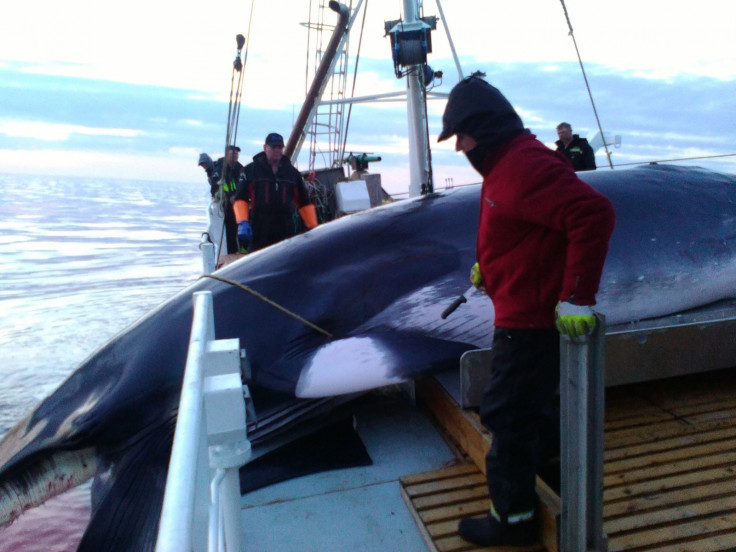Iceland suspends whale hunting until August following public outcry
Iceland, Norway, and Japan are the three countries that allow the practice of whale hunting for profit.

Iceland has finally decided to suspend the practice of whale hunting until the end of August. The development comes after objections by conservationists and animal rights activists.
According to the data provided by Iceland's Ministry of Industries and Innovation, the country accounts for roughly 3% of all whales hunted globally. It is said that whaling is part of its culture and traditions.
The country earns a significant portion of its total GDP from whale hunting. The practice has registered a decline in the last few years, and people's opinions about whaling have not been too favourable either.
A recent survey conducted in Iceland revealed that 51 per cent of people have turned against it over the years. The latest suspension of the activity has also been welcomed by the tourism sector and locals, writes ABC News.
"I have decided to suspend all whaling operations," said Minister of Food, Agriculture and Fisheries Svandis Svavarsdottir, in a statement on Tuesday.
"This activity cannot continue in the future if the authorities and the license holders cannot ensure the fulfilment of the welfare requirements."
There will be no whaling in Iceland this summer! 🥳
— Whale and Dolphin Conservation (WDC) (@whalesorg) June 20, 2023
This is HUGE!
Together with the support of other marine charities and a public outcry in Iceland and abroad, we've saved around 150 fin whales from a painful and horrific death this year.
The Icelandic Government's own advice… pic.twitter.com/8Sl7utQi7K
Iceland, Norway, and Japan are the three countries that allow the practice of whale hunting for profit. Despite the International Whaling Commission (IWC) banning commercial whaling in 1986, whales continue to be killed in their hundreds.
The commission sets limits for commercial whaling, with Norway and Iceland as exceptions. The ban, also called the commercial whaling moratorium, is binding on all other members of the IWC. Norway and Iceland set their own whaling limits.
The hunting of fin whales in Iceland was resumed in 2006 after the IWC put a moratorium on whaling. Iceland's current whaling quota is due to expire at the end of 2023, following which the country's Fisheries Minister will have to authorise a new five-year quota.
The whaling season in Iceland was due to start tomorrow. Bravo to the Icelandic protests & to the Icelandic govt which has just issued a STOP order at least until 31 Aug. The fin whales around Iceland can now enjoy their summer. Let's hope this will truly be the end. Orig story… pic.twitter.com/28ARVelU76
— Erich Hoyt (@ErichHoyt) June 20, 2023
The government's move to suspend whaling until August is being seen as a step to rethink the future of whaling in the country. It now remains to be seen if Iceland does away with the practice completely or manage to find a loophole that allows whaling.
Last month, a study conducted by the Icelandic government revealed that more than 40% of whales killed during its most recent whaling season suffered slow and painful deaths. It also needs to be noted that more than 1,900 fin and minke whales have been killed in Iceland since 1986.
According to the World Wildlife Fund, fin whales in the North Atlantic are listed as endangered species. They are the second largest mammals on earth. Commercial whaling practices have also put the minke whale population in danger. Minke whales are relatively small in size and are used for food and scientific research in Greenland, Japan, and Norway.
Japan is currently the biggest market for whale meat. It resumed commercial whaling activities in 2019 after leaving the IWC.
Other threats for whales:
One of the biggest threats to their existence is collisions with ships and entanglement in fishing nets and equipment. According to the National Oceanic and Atmospheric Administration (NOAA), there have been 101 large whale vessel collisions since 2013 in the US West Coast Region.
Marine biologists and scientists also speculate that sonars from military boats may be interfering with the whale's brain wave activity, leading them to become disoriented or sick and forcing them to swim towards shallow waters, where they end up beaching themselves.
Beaching, or cetacean stranding, is the phenomenon of aquatic mammals stranding themselves on land, usually on a beach. As many as 2,000 mammals beach themselves accidentally every year. Whales that get beached often die of dehydration, collapse under their own weight, or drown when high tide covers their blowholes.
An increasing number of man-made materials and chemicals are polluting the oceans, leading to the birth of aquatic mammals with deformities and their early deaths.
© Copyright IBTimes 2025. All rights reserved.






















